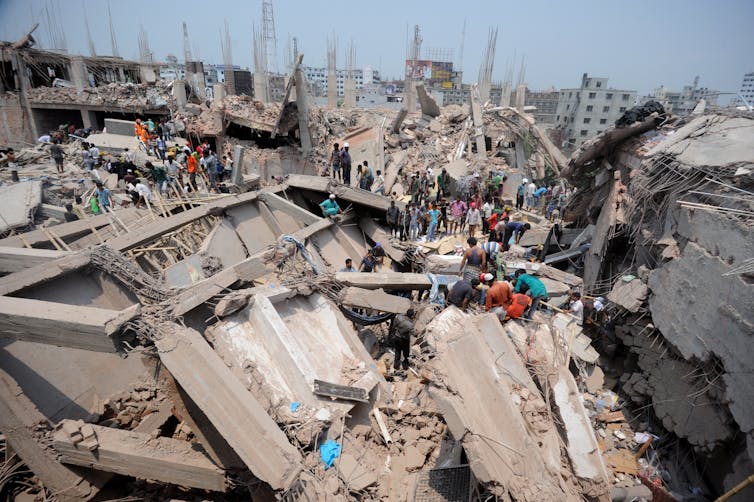When you purchase a product, I imagine you hope that the product was made with attention to human rights: that production occurred without unfair wages, human trafficking, forced or child labour, discrimination, abuses, or safety hazards. Perhaps you also hope that the company producing the item is conscious of avoiding environmental and ecological damage. But in reality, many products are made in factories where conditions are far from humane or ethical. In many instances, we know very little about the way products are made.
In some cases, this can lead to disaster. Take the 2013 Rana Plaza disaster in Bangladesh, which killed more than 1,100 workers who were engaged in productions of garments for big brands such as Inditex, Mango, Loblaw, Primark, and Walmart. Such a devastating incident reminds us that corporate social responsibility (CSR) can be a matter of life and death.
The idea that corporations should respect human rights and the environment has been around for a long time. But it only started to be seen in legal terms fairly recently. The term CSR began to be widely used in 1990s, when sweatshops supplying garments to Nike came to the world’s attention through widespread media coverage. It gains further traction each time the world experiences corporate social and environmental problems (BP’s 2010 Deepwater Horizon oil spill for example).

Early scholars defined CSR as a self-regulatory mechanism ensuring that corporations voluntarily conduct their business in a way that is socially responsible, ethical and takes care of the environment. But these scholars gradually observed that in the absence of regulatory pressures, companies only conducted CSR and related disclosure activities (including pouring billions of dollars into building CSR teams) whenever they experienced greater pressure from the public and social movements. Because of the absence of regulatory expectations, CSR activities were not regular or frequent.
But over the past decade, CSR has in some instances become a mandatory corporate activity. CSR now means that many corporations now legally have to comply with particular social disclosure legislation.
Modern CSR
New forms of regulation have emerged all over the world. For instance, both the 2010 California Transparency in Supply Chain Act (CTSCA) and the UK’s 2015 Modern Slavery Act require companies to disclose the actions they take to tackle modern slavery, child labour, human trafficking throughout their production chains (including supply chains overseas). Such actions are not just confined to the global north. Section 135 of the Indian Companies Act (2013) prescribes Indian companies to spend 2% of their pre-tax profit on CSR.
These new forms of CSR regulation mark a major shift in corporation law. For the first time, certain disclosures are required to be made, regardless of whether these are relevant to shareholders or not. The aim of this is to achieve transparency for wider groups (NGOs, media, local community, consumers and so on) on issues of human rights and social responsibility.
In addition, companies are now often required not only to take action to eliminate modern slavery or human trafficking or human rights violations in their home countries, but also to prevent such irresponsibility in their production locations (or supply chains) in developing countries.
Such regulations are therefore discouraging companies from sourcing products from factories similar to Rana Plaza. For many suppliers in developing nations, such regulations exert mandatory social compliance on them from their buyers (companies) in the West.

Does it work?
So now that compulsory CSR has been around in some countries for a few years, do they actually work? I have been researching whether CSR actually advances corporate social transparency and accountability as expected.
First, myself and colleagues investigated the CTSCA. This mandated CSR disclosure requires US firms based in California to disclose, at minimum level, efforts to eradicate slavery and human trafficking from their supply chains on an annual basis.
Based on a sample of 105 US retail companies subject to the CTSCA, we found that in CTSCA’s first year, 83% of firms disclosed their efforts to eradicate slavery and human trafficking, but disclosures in general were not detailed. Extensive disclosure for any of the specific categories was quite limited, with only 4% firms including extensive information disclosure across all five required items investigated. As such, to ensure greater corporate transparency and accountability, it is important that regulators enforce extensive disclosure requirements.
Then, in another international collaboration, we looked at how the US Conflict Mineral Rule (Section 1502) affects corporate disclosure pertaining to the elimination of human trafficking and slavery in global mineral supply chains. Like the CTSCA, Section 1502 requires minimum disclosure by relevant firms. This means that at a minimum level they have to disclose what they are doing or not doing to prevent human trafficking in their supply chains.
Focusing on a sample of global companies that deal with electronics from 20 countries, we found that companies’ conflict mineral disclosures tended not to be extensive, but that social movements (via NGO collaborations or activist protests) lead to more comprehensive, and more transparent, disclosures.
This has practical and policy implications: improved corporate transparency is the result of social movement actions via NGOs. This means that regulation on its own may not result in comprehensive and quality CSR disclosures.
While social movements have led regulators to enact new CSR regulation, regulation on its own may not create much improvement of CSR. This means that continuous monitoring of corporate compliance with CSR legislation by social activists is necessary to achieve the regulatory objective of CSR.

